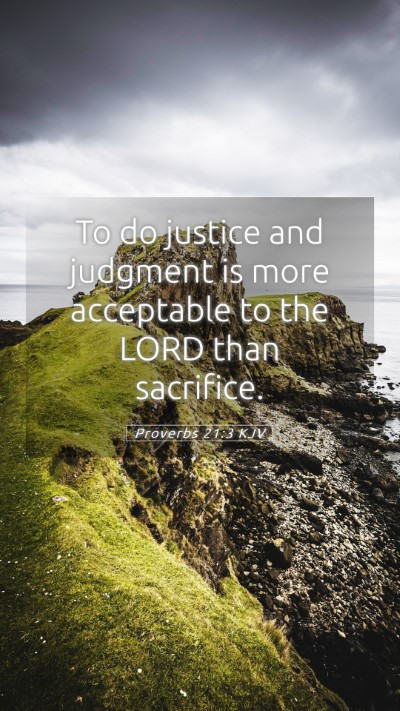Understanding Proverbs 21:3
Bible Verse: Proverbs 21:3 - "To do righteousness and justice is more acceptable to the LORD than sacrifice."
Overview of the Verse
This powerful verse relays a profound biblical truth that prioritizes moral and ethical behavior over ritualistic sacrifice. The emphasis is on the intrinsic value of righteousness and justice in the eyes of God.
Combined Commentary Insights
Matthew Henry's Commentary
Matthew Henry emphasizes that the Lord values the moral actions of his followers more than mere ritualistic observance. He suggests that God desires true sincerity in our actions, which includes living justly and righteously in our daily lives. This portrayal of God's preference shows that external acts, like sacrifices, hold no weight if the heart is not aligned with justice and righteousness.
Albert Barnes' Notes
Albert Barnes draws attention to the understanding that sacrifices can sometimes mask deeper moral failures. He interprets this verse to indicate that while sacrifices are part of the religious life, they are meaningless if not accompanied by genuine ethical behavior. The core message is not to neglect the ritual, but to recognize that the intent and character behind our actions are what truly please God.
Adam Clarke’s Commentary
Adam Clarke expounds on the idea that doing good for others and displaying justice in our actions represents a true form of worship. He points out that God's desire is for His followers to act ethically in all areas of life rather than just performing religious duties. Clarke sees this as a call for consistency in the character of one's actions and relationships with others.
Key Themes
- Righteousness Over Ritual: The verse underscores that doing the right thing—being just and fair—is more important to God than the performance of religious rituals.
- The Nature of True Worship: True worship encompasses ethical living and the treatment of others, revealing that our actions reflect our relationship with God.
- Heart Condition: God looks at the heart behind actions; the intent is crucial. It serves as a reminder to check our motives when we engage in religious activities.
Application of the Verse
Incorporating the lessons from Proverbs 21:3 into everyday life can transform how one approaches both religious obligations and interpersonal relationships. Engaging in acts of kindness, striving for justice, and embodying righteousness in daily endeavors can be seen as a true form of devotion.
Cross-References
- 1 Samuel 15:22: "Has the LORD as great delight in burnt offerings and sacrifices, as in obeying the voice of the LORD?"
- Micah 6:8: "He has shown you, O man, what is good; And what does the LORD require of you but to do justly, to love mercy, and to walk humbly with your God?"
- Matthew 12:7: "But if you had known what this means, 'I desire mercy, not sacrifice,' you would not have condemned the guiltless."
Conclusion
Proverbs 21:3 serves as a timeless reminder of God's expectations regarding our moral conduct. It teaches us that while the rituals and sacrifices may continue, they mean little if not grounded in an authentic pursuit of justice and righteousness. This understanding can profoundly impact our Bible study insights and interpretation of scripture, ultimately leading to a more fulfilling spiritual life.


